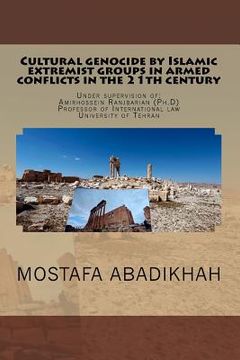Cultural genocide by Islamic extremist groups in armed conflicts in the 21th century (en Inglés)
Reseña del libro "Cultural genocide by Islamic extremist groups in armed conflicts in the 21th century (en Inglés)"
Cultural genocide or cultural cleansing is a concept that The Polish jurist "Raphaël Lemkin" established in 1944 as a component of genocide; in which, since that time, it has become known as "cultural genocide". This term refers to set of activities that follow the purpose and intent of physical genocide; namely, destruction with the intent to destroy a racial, religious, ethnic or national group as such. Raphaël Lemkin, the architect of "the United Nation of Genocide convention" and inventor of the "Genocide" word and also member of the special committee for the convention draft codification, regarded the collection of the measures as cultural genocide in the draft of convention. One of they is The systematic destruction of the historical and religious monuments or deviation in the using of them, destruction of the documents and objects that are valuable to historical, artistic and religious and also destruction of the religious stuffs. In spite of the fact that the socialist countries and some of the third world countries protected from the cultural genocide term, and The drafters of the 1948 Genocide Convention considered the use of the term; but in order to the objections of the western and Latin American countries, the drafters dropped it from their consideration.But the attempt of the countries is not limited to the genocide convention and continued. as In Article 7 of a 1994 draft of the "United Nations Declaration on the Rights of Indigenous Peoples" used the phrase "cultural genocide" but did not define what it meant The United Nations Declaration on the Rights of Indigenous Peoples was adopted by the United Nations General Assembly during its 62nd session at UN Headquarters in New York City on 13 September 2007, but only mentions "genocide, or any other act of violence" in Article 7 (the only reference to genocide in the document). Although, the cultural genocide term was eliminated from the genocide convention, but the attempt for the introduce its concept in international law can be a step toward encouraging the countries of the world for preventing of the cultural genocide through approval the international documents with an effective sanction. And on the other hand must be answer to this question: are there any examples of the cultural genocide in the contemporary world (21th century), so that the experts of the international criminal law have explained its concept. Therefore, hypothesis in this book are including: 1-In 21th century, there are some cases about cultural heritage destruction, but generally, the cultural genocide term doesn't use about them. Such as world cultural heritage destruction by extremist Groups where have registered in UNESCO in Iraq, Syria and Mali.2-Although, ICC has considered the cultural destruction issue in Timbuktu in the recent years, ICC has put this measures in war crime framework, while if the statute of ICC had criminalized the cultural genocide term, the Cultural destruction in Mali would have recognized as cultural genocide due to the circumstances, "actus rea" and "mens rea" that have been introduced for cultural genocide.3-Although, nowadays the cultural genocide is not considered in formal and legal framework, according to the UNESCO approach and some of the doctrines about the events in Syria, Iraq and Mali, the codification of cultural genocide is more probable. There are three chapters in this book including: 1.In first chapter, deals with the protection of cultural heritage and the cultural genocide term is explained in general. 2.In second chapter, deals with the events happened in Iraq and Syria. in addition to answering to this question: why these events are cultural genocide?3.In third chapter, deals with the events happened in Mali that are famous to the Mali war. And the cultural genocide is considered during the Mali war.

